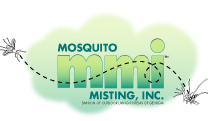Mosquitoes and Their Habits
Is it true that the mosquito bites because it feeds on blood?
No. Only the female mosquito bites. That is because she is getting protein nourishment from the host’s blood prior to laying her eggs. Mosquitoes actually feed on the sweet nectar of plants. In the search for blood, female mosquitoes bite birds, frogs, snakes, and mammals. When she bites, the mosquito injects saliva which slows down the coagulation of the blood so that it will flow more easily. It is your body’s allergic reaction to the saliva which causes the welts and the skin itch from the bite.
What diseases can they carry and how do they become infected?
Mosquitoes are carriers. They transmit disease by biting a host, such as an infected bird, and then biting another victim, thus transmitting the disease. Among the most common diseases transmitted are malaria, dingus fever, and yellow fever, which are prevalent in other parts of the world. Locally, the mosquito can transmit West Nile virus, encephalitis, and meningitis. All of these are related and cause swelling of the brain, the membrane around the brain, or inflammation of parts of the nervous system. Although only a small percentage of people contact these diseases, and when infected, most cases are not serious and have flu like symptoms. Of the people infected, only a small percentage of those cases become serious. However, some of the most serious cases (4% of that total) are fatal. http://en.wikipedia.org/wiki/West_Nile_virus
Also, the mosquito can infect our pets. Canine heartworm is another disease that is transmitted by mosquitoes and can be fatal if not immediately treated.
For more information and reports about the West Nile virus, please visit the CDC website by clicking on the following link. http://www.cdc.gov/ncidod/dvbid/westnile/index.htm
How prevalent a carrier of disease are mosquitoes?
The mosquito is considered the most dangerous insect species. By far, it is the number one carrier of disease in the world. More deaths, per year, worldwide can be attributed to diseases transmitted by mosquitoes. For example, every year there are more than 1,000,000 deaths due to malaria alone. About 70% of those are children under five years old.
Why do mosquitoes infect so many people worldwide with diseases?
Simply, it is numbers. There are so many mosquitoes in every part of the world, and they multiply easily. There are more than 3000 different varieties and it has been estimated that the worldwide population is in excess of 100 trillion. Mosquitoes inhibit mostly tropical climates, but, because of their adaptability, they are found nearly everywhere in the world, including the artic and desert regions.
Where do the mosquitoes typically live and breed?
Mosquitoes are drawn to damp shady places. During the day when most species are not active, they like to rest on the under side of shrub leaves, ground cover, turf grasses, pine straw beds, and under porches or decks. They have a tendency to breed on or around wet areas or puddled water, which has been left standing stagnant for about five days or more. Water can accumulate after a rain or on a daily basis from an irrigation system. It doesn’t take much water to attract the female mosquito when she is ready to lay eggs. For example, a dish, left standing that contains as little as a few tablespoons of water, could potentially provide a breeding place for more than 20,000 mosquitoes over a season. Vigilance should be taken to prevent water from standing more than a few days. Typical problem areas are:
- Drains that become clogged with leaves and debris
- Gutters that need cleaning
- Bird baths with water left standing or unchanged
- Open containers,such as buckets or flower pots, left with exposed rain water
- Child wading pools
- Tires or trash that collect water
- Drains or creek beds that accumulate rain water that doesn’t completely run off or dry up.
What attracts mosquitoes to people and pets?
Mosquitoes zone in on body warmth, odor, moisture, and carbon dioxide from the breath of mammals. Working in the yard, especially in dark cloths, is a beacon for attracting mosquitoes. Wearing perfume or cologne also will readily attract them. Some people seem to be more susceptible than others to mosquito bites because each person has different body chemistry. Also, their allergic reaction to the mosquito can vary.
Although humans are a secondary source for the mosquito bite, vigilance should be taken when outside to avoid being bitten.
What is the life span of a mosquito?
Mosquitoes typically live 2-3 weeks. Depending on weather conditions and temperatures, their life span, in some cases, can extend to nearly two months.
How many mosquito eggs can one adult lay?
During a typical lifetime, the female adult mosquito, can lay 2-3 egg clusters. The number of eggs can vary by species, but typically, each cluster, which is deposited on water or in damp areas to hatch, contains about 100-300 eggs. The female might have only been propagated one time by the male.
When are the mosquitos most active?
Mosquitos are primarily nocturnal. As such, they are most active at dawn and in the evenings. In Atlanta, their activity starts approximatly in early spring (March) when tempertures start warming. Depending on the season, their activity can continue as late as November.
To find out up to date mosquito activity in Atlanta, visit The Daily Mosquito Index by clicking [ here]
|





